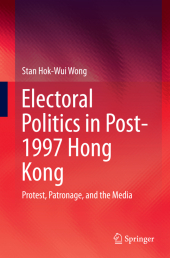 Neuerscheinungen 2016Stand: 2020-02-01 |
Schnellsuche
ISBN/Stichwort/Autor
|
Herderstraße 10
10625 Berlin
Tel.: 030 315 714 16
Fax 030 315 714 14
info@buchspektrum.de |

Stan Hok-Wui Wong
Electoral Politics in Post-1997 Hong Kong
Protest, Patronage, and the Media
Softcover reprint of the original 1st ed. 2015. 2016. ix, 180 S. 2 SW-Abb., 7 Farbabb. 235 mm
Verlag/Jahr: SPRINGER, BERLIN; SPRINGER SINGAPORE; SPRINGER 2016
ISBN: 9811013543 (9811013543)
Neue ISBN: 978-9811013546 (9789811013546)
Preis und Lieferzeit: Bitte klicken
This book offers a novel and parsimonious framework to help understand Hong Kong´s lengthy democratic transition by analyzing the electoral dynamics of the city´s competitive authoritarian political system, where pro-Beijing and pro-democracy parties have struggled to keep each other in check. The author demonstrates how a relatively liberal media environment has shaped the electoral incentives of the opposition and the pro-establishment elite differently, which has helped the latter improve its basis of electoral support. The political explanation the book puts forward seeks to shed new light on why many autocracies are interested in regularly holding elections that are considered somewhat competitive. This book will be of great interest not only to specialists in comparative studies of democratization, but also to all those concerned with Hong Kong´s democratic transition.
Contents.- Abbreviations.- Acknowledgements.- Chapter 1: Introduction.- 1.1: Media Environment and Civil Society in Hong Kong.- 1.2: Elections in Hong Kong.- 1.3: The Puzzle.- 1.4: My Argument.- 1.5: Why Hong Kong?.- 1.6: The Methodology.- 1.7: Plan of the Book.- Chapter 2: Protest and Patronage: A Theory of Electoral Contest in Competitive Authoritarianism.- 2.1: About the Stakeholders.- 2.2: The Analytical Model.- 2.2.1: Baseline Model: Single Source of Protests.- 2.2.2: Multiple Sources of Protests.- 2.3: Conclusion.- 2.4: Appendix: Proofs.- Chapter 3: Birds in a Cage: Political Institutions and Civil Society in Hong Kong.- 3.1: Historical Background.- 3.2: Major Institutional Arrangements under the Basic Law.- 3.2.1: Relationship between the Central Government and the HKSAR.- 3.2.2: Judiciary.- 3.2.3: Civil Liberties.- 3.2.4: Chief Executive.- 3.2.5: Legislature.- 3.2.6: Interpretation and Amendment of the Basic Law.- 3.3: Last Years of the Colonial Administration.- 3.4: After 1997.- 3.5: July 1, 2003.- 3.6: Conclusion.- Chapter 4: Power to the People: Changing Electoral Strategies of the Pro-democracy Opposition Elite.- 4.1: Political Developments after the July 1, 2003 Protest.- 4.1.1: Emergence of New Parties.- 4.1.2: Rise of Contentious Politics.- 4.1.3: Rise of Internal Strife within the Opposition Camp.- 4.2: Key Developments of Civil Society.- 4.3: Conclusion.- Chapter 5: All Politics is Local: Grassroots Strategy of Beijing-sponsored Parties.- 5.1: The Pro-Beijing Camp: Changes and Continuities.- 5.2: Building a United Front at the Grassroots.- 5.3: Beijing-sponsored Parties´ Incentives.- 5.4: Beijing-sponsored Parties´ Grassroots Strategy in Action.- 5.4.1: Defending Their Own Turf.- 5.4.2: Invading Rivals´ Turf.- 5.4.3: Candidate Selection.- 5.5: "Independent" Candidates- 5.6: Redistricting.- 5.7: Conclusion.- Chapter 6: Surrounding the Cities from the Countryside: An Empirical Assessment of the Electoral Effects.- 6.1: The Causal Mechanisms.- 6.2: The Electoral Effects.- 6.2.1: A First Glance.- 6.2.2: A Closer Look.- 6.3: Conclusion.- 6.4: Appendix: Details on the Regression Discontinuity Design.- Chapter 7: Elephants versus Termites: Lessons from Hong Kong.- Appendix A Interviews Conducted.- bibliography.- Index
Stan Hok-Wui Wong is an assistant professor in the Department of Government and Public Administration at the Chinese University of Hong Kong. His research interests include authoritarian politics and democratization with a focus on Asia. His articles have appeared in journals such as Electoral Studies, Journal of Contemporary Asia, and Journal of East Asian Studies.


